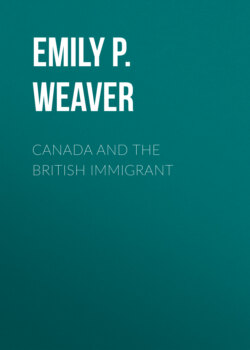Читать книгу Canada and the British immigrant - Emily P. Weaver - Страница 7
На сайте Литреса книга снята с продажи.
ОглавлениеQUEBEC FROM THE CHÂTEAU FRONTENAC
That they are British (to return to the point whence we started) is due above all to the sturdy spirit of the brave old Loyalists who formed the earliest large accession of British immigrants to Canada. They had their faults; they were not free from the bitterness and cruelty with which they charged their victorious opponents. They were martyrs of a lost cause, and as a class were never remarkably patient sufferers; but they were undoubtedly fine material for the building of a new nation, and the debt that Canada owes to them is not to be lightly estimated.
When it appeared (as it soon did appear) that the form of representative government granted to the colonies was only a shadow of the popular government of the Mother-land, the liberty-loving colonists began a persistent and long-continued agitation for a change. The flaws in the colonial form of government were that at first the representatives of the people had no control over the finances of the several provinces; and that the government was administered by the officials of what was called the “Executive Council,” who were appointed, and could only be removed, by the royal governor representing the Crown, and were not in any way responsible to the electors of the colonial Assemblies. The executive councillors were in a position to bid defiance to the popular branch, especially as the Legislative Council, or Upper House, of the colonial legislatures, composed of men appointed by the governor, usually made common cause with them against the Assemblies. In fact, in the Canadas many men had seats in both councils; and in Nova Scotia and New Brunswick one council had both legislative and executive functions.
After a short period, even the governors sent out from England were at a great disadvantage compared with the councillors, many of whom had spent the greater part of their lives in the colony. A newly-arrived governor naturally looked to his councillors for advice and information. It was they and their families who formed the most important part of his little court, and if he did not speedily fall under their influence, he had many difficulties thrown in his way. In Lower Canada the political troubles were aggravated by the fact that almost all the members of the legislature and Executive Councils belonged to the small English-speaking Protestant minority.
For nearly half a century the disputes between the different branches of the government continued; but at last, after the rebellion of 1837-38, Lord Durham was sent as High Commissioner to Canada, and though his conduct of affairs was severely criticized at home, he managed to probe to the bottom the chronic state of discontent in the colonies; and the remedy he recommended was that the executive in the colonies should be made, as in England, responsible to the people, and that the body of officials in the several provinces should only continue to rule while they could command the support of a majority in the Assemblies. His advice was followed, and within a few years all the provinces had “Responsible Government.”
Thus was forged another link which bound the colonies to the Empire, for at last the people felt that the Mother-land could no longer be blamed for any blunders and wrong-doing in the administration of the governments on this side of the ocean; and the electors knew that if the government was not so good as it might be, it was at least as good as those who put it into power deserved to have. The system had also, like its British model, a flexibility and a capacity for readjustment to new situations or more advanced views, which made it peculiarly suited to a land where conditions are constantly changing.
The government has remained to this day essentially British in its underlying principle of the ultimate responsibility of the cabinet to the electors, though in some respects, since the confederation of the provinces, it has had in outward appearance a considerable resemblance to the government of the United States.
BREAKING THE PRAIRIE BY TRACTOR
AT VEGREVILLE, ALBERTA.
